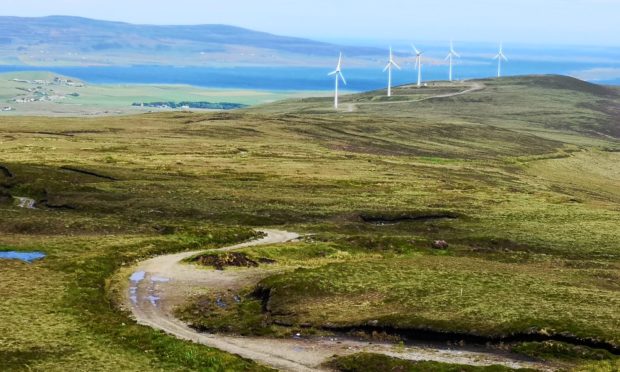A site in Orkney has been earmarked for a hydrogen production facility that would be powered by an island wind farm.
Eneus Energy, in partnership with locally-owned Hammars Hill Energy and Green Cat Renewables, has identified Hammars Hill in Evie as the “perfect setting” for the project.
The developers say the facility would create seven full-time jobs and add to Orkney’s renewable energy credentials.
Plans have been lodged with Orkney Islands Council for the facility, which would be situated on an agricultural site and create hydrogen and ammonia to be used locally.
It is hoped permission can be granted this year and Eneus is timing the development of the facility to tie in with proposals to add two turbines to the existing five-turbine Hammars Hill Wind Farm.
The wind farm would power the facility, turning water and air into ammonia without releasing carbon emissions.
Chris Bronsdon, CEO of Eneus, said: “Ammonia has direct opportunities for use as a fuel (from shipping to fuel cells for power and telecommunications) and also to act as a store for the supply of hydrogen.
“Turning the ammonia back into hydrogen for a fuel cell is an established technology, and has no emissions when in use, other than nitrogen which has to be harvested from the atmosphere to make the ammonia in the first place.
“This allows the provision of pure hydrogen for fuel cell electric vehicles, ships and even aviation.”
He said the project could also help the islands’ issue with grid capacity, adding: “Active network management has improved the carrying capacity of the grid on Orkney, but with more projects being proposed the system limits are constraining the operation of existing renewables projects and the development of additional capacity.
“Bringing this project to Orkney will add load to the system which converts the renewable energy into a green (zero carbon) fuel that is easily stored and transported.
“As a production process, it converts the renewable power into chemical energy, rather than storing it electrically, and it can be moved around using LPG tankers on the road, or existing LPG ships in larger volumes.”
Morag Watson, Director of Policy at Scottish Renewables, said: “Scotland’s island communities have an abundance of natural resource for generating renewable energy, but unfortunately grid capacity constraints often mean that renewable energy generators have to limit production.
“Although at a relatively early stage of development, hydrogen and possibly ammonia will play a role in our future low-carbon energy system.
“Orkney is already leading the way in the production of hydrogen from renewable electricity such as wind and tidal power, which is exciting as it allows us to utilise a clean energy resource in a way which doesn’t rely on the transmission network.”
